Analyzing Economic Challenges and Solutions in Zimbabwe: A Report
VerifiedAdded on 2023/02/01
|11
|2357
|47
Report
AI Summary
This report provides a detailed analysis of the economic challenges faced by Zimbabwe, a nation grappling with sluggish growth and high unemployment. The report identifies key issues such as corruption, hyperinflation, foreign currency crises, and trade imbalances as significant obstacles to economic progress. It highlights the detrimental effects of corruption on investment and entrepreneurship, the impact of hyperinflation on business operations, and the consequences of foreign currency shortages on international trade. The report proposes a range of solutions, including eliminating corruption, creating job opportunities, adopting a stable currency, attracting foreign investment, encouraging the return of skilled Zimbabweans, and negotiating with international lenders. The report emphasizes the need for the Zimbabwean government to implement these measures to foster sustainable economic growth and improve the nation's overall economic performance.
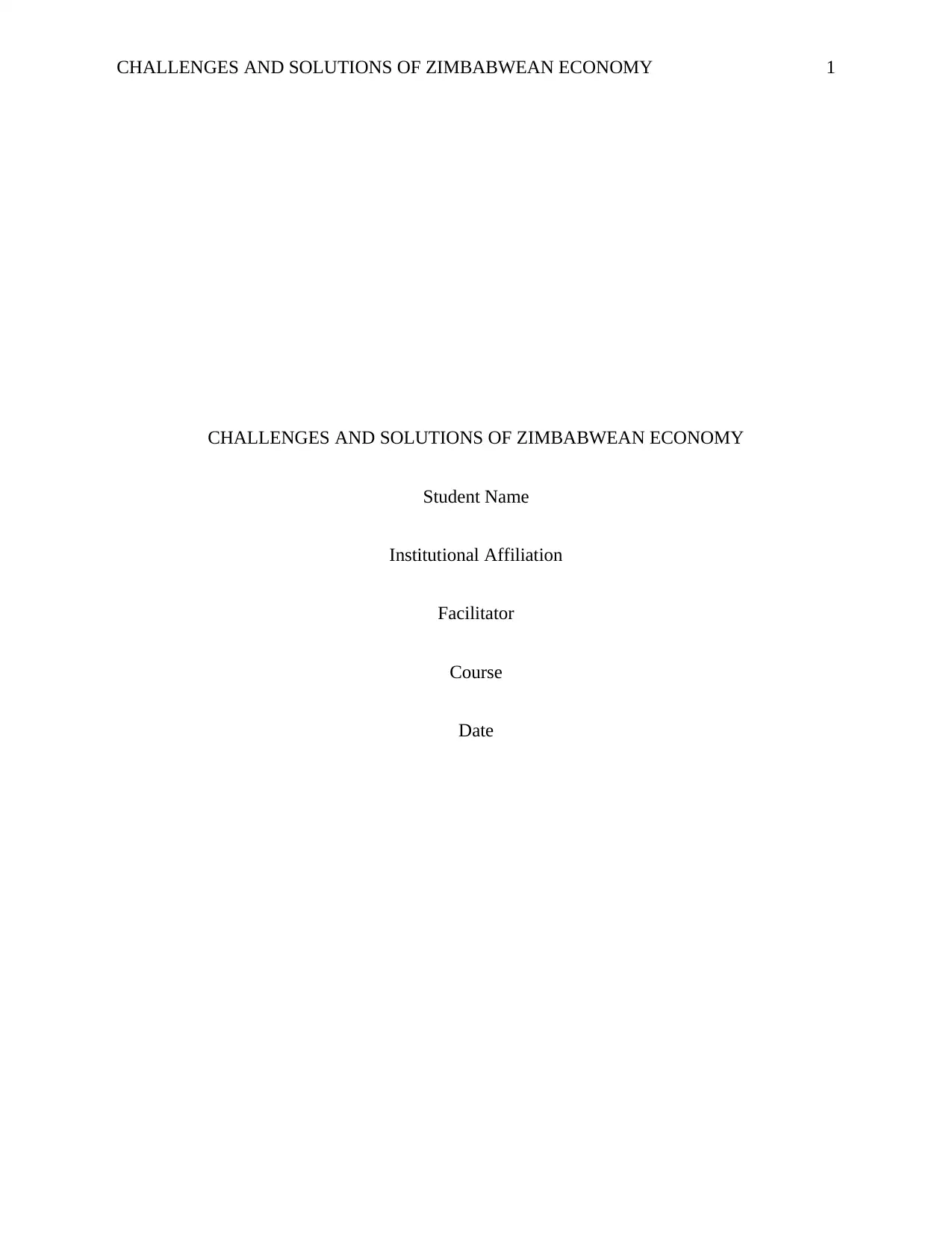
CHALLENGES AND SOLUTIONS OF ZIMBABWEAN ECONOMY 1
CHALLENGES AND SOLUTIONS OF ZIMBABWEAN ECONOMY
Student Name
Institutional Affiliation
Facilitator
Course
Date
CHALLENGES AND SOLUTIONS OF ZIMBABWEAN ECONOMY
Student Name
Institutional Affiliation
Facilitator
Course
Date
Paraphrase This Document
Need a fresh take? Get an instant paraphrase of this document with our AI Paraphraser
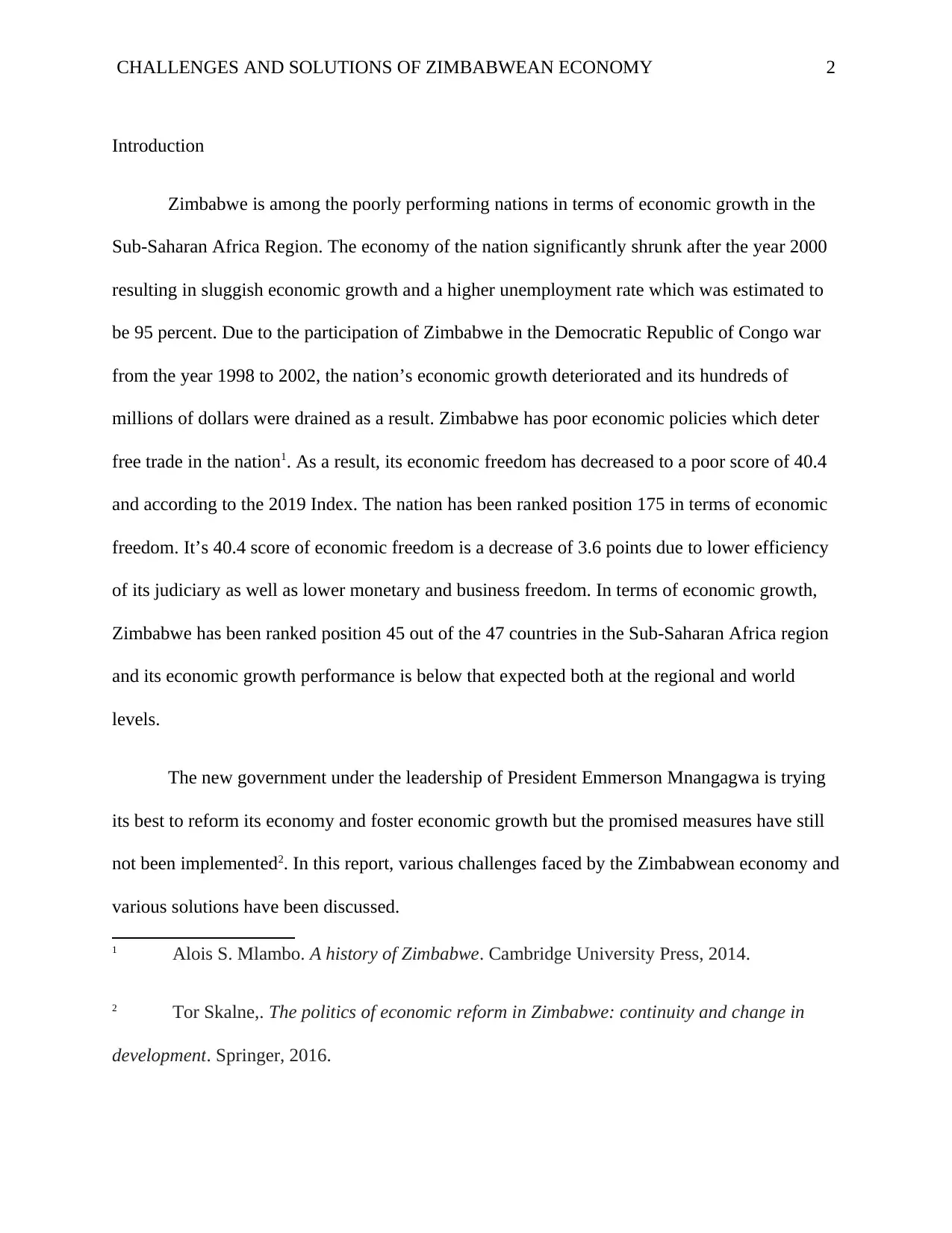
CHALLENGES AND SOLUTIONS OF ZIMBABWEAN ECONOMY 2
Introduction
Zimbabwe is among the poorly performing nations in terms of economic growth in the
Sub-Saharan Africa Region. The economy of the nation significantly shrunk after the year 2000
resulting in sluggish economic growth and a higher unemployment rate which was estimated to
be 95 percent. Due to the participation of Zimbabwe in the Democratic Republic of Congo war
from the year 1998 to 2002, the nation’s economic growth deteriorated and its hundreds of
millions of dollars were drained as a result. Zimbabwe has poor economic policies which deter
free trade in the nation1. As a result, its economic freedom has decreased to a poor score of 40.4
and according to the 2019 Index. The nation has been ranked position 175 in terms of economic
freedom. It’s 40.4 score of economic freedom is a decrease of 3.6 points due to lower efficiency
of its judiciary as well as lower monetary and business freedom. In terms of economic growth,
Zimbabwe has been ranked position 45 out of the 47 countries in the Sub-Saharan Africa region
and its economic growth performance is below that expected both at the regional and world
levels.
The new government under the leadership of President Emmerson Mnangagwa is trying
its best to reform its economy and foster economic growth but the promised measures have still
not been implemented2. In this report, various challenges faced by the Zimbabwean economy and
various solutions have been discussed.
1 Alois S. Mlambo. A history of Zimbabwe. Cambridge University Press, 2014.
2 Tor Skalne,. The politics of economic reform in Zimbabwe: continuity and change in
development. Springer, 2016.
Introduction
Zimbabwe is among the poorly performing nations in terms of economic growth in the
Sub-Saharan Africa Region. The economy of the nation significantly shrunk after the year 2000
resulting in sluggish economic growth and a higher unemployment rate which was estimated to
be 95 percent. Due to the participation of Zimbabwe in the Democratic Republic of Congo war
from the year 1998 to 2002, the nation’s economic growth deteriorated and its hundreds of
millions of dollars were drained as a result. Zimbabwe has poor economic policies which deter
free trade in the nation1. As a result, its economic freedom has decreased to a poor score of 40.4
and according to the 2019 Index. The nation has been ranked position 175 in terms of economic
freedom. It’s 40.4 score of economic freedom is a decrease of 3.6 points due to lower efficiency
of its judiciary as well as lower monetary and business freedom. In terms of economic growth,
Zimbabwe has been ranked position 45 out of the 47 countries in the Sub-Saharan Africa region
and its economic growth performance is below that expected both at the regional and world
levels.
The new government under the leadership of President Emmerson Mnangagwa is trying
its best to reform its economy and foster economic growth but the promised measures have still
not been implemented2. In this report, various challenges faced by the Zimbabwean economy and
various solutions have been discussed.
1 Alois S. Mlambo. A history of Zimbabwe. Cambridge University Press, 2014.
2 Tor Skalne,. The politics of economic reform in Zimbabwe: continuity and change in
development. Springer, 2016.
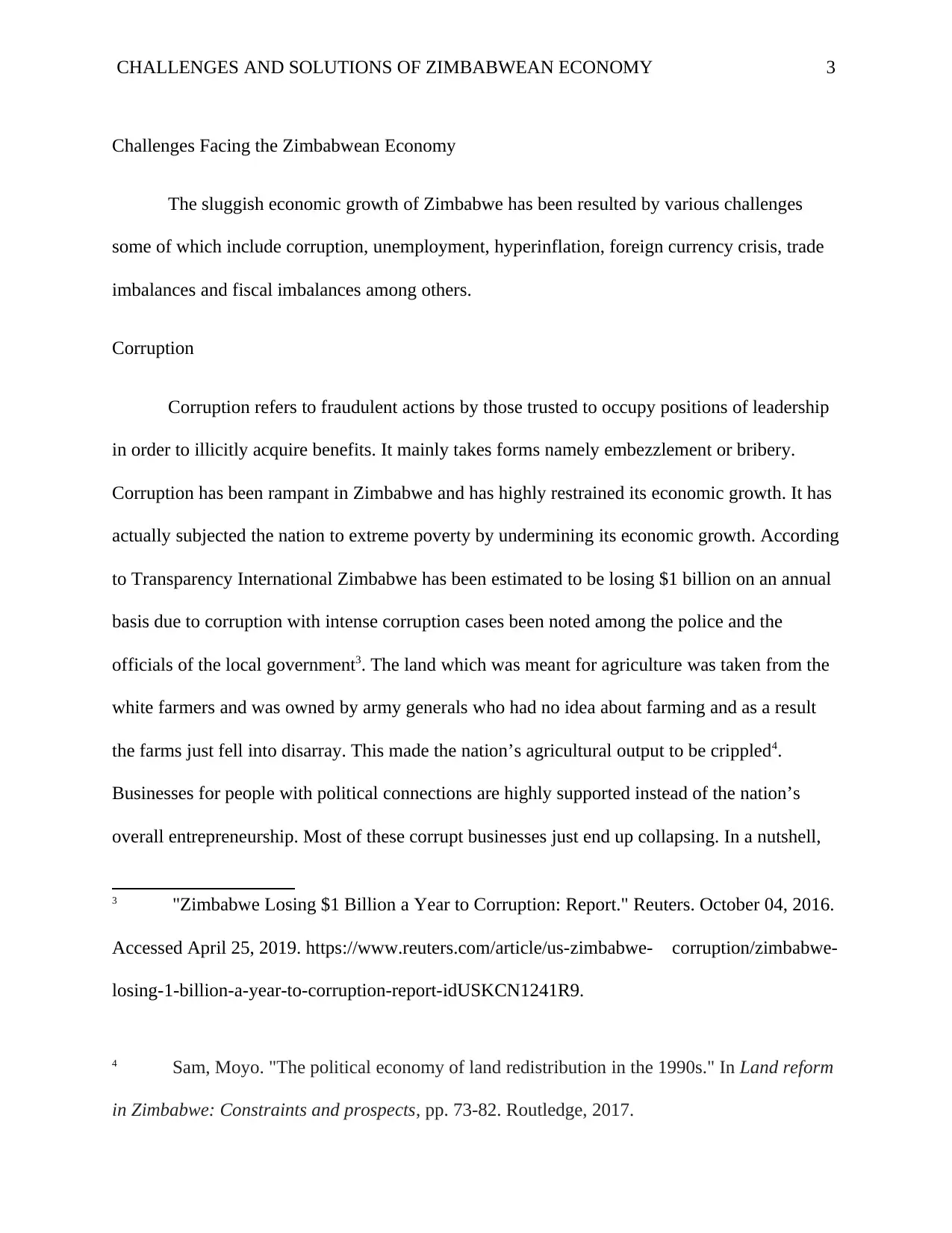
CHALLENGES AND SOLUTIONS OF ZIMBABWEAN ECONOMY 3
Challenges Facing the Zimbabwean Economy
The sluggish economic growth of Zimbabwe has been resulted by various challenges
some of which include corruption, unemployment, hyperinflation, foreign currency crisis, trade
imbalances and fiscal imbalances among others.
Corruption
Corruption refers to fraudulent actions by those trusted to occupy positions of leadership
in order to illicitly acquire benefits. It mainly takes forms namely embezzlement or bribery.
Corruption has been rampant in Zimbabwe and has highly restrained its economic growth. It has
actually subjected the nation to extreme poverty by undermining its economic growth. According
to Transparency International Zimbabwe has been estimated to be losing $1 billion on an annual
basis due to corruption with intense corruption cases been noted among the police and the
officials of the local government3. The land which was meant for agriculture was taken from the
white farmers and was owned by army generals who had no idea about farming and as a result
the farms just fell into disarray. This made the nation’s agricultural output to be crippled4.
Businesses for people with political connections are highly supported instead of the nation’s
overall entrepreneurship. Most of these corrupt businesses just end up collapsing. In a nutshell,
3 "Zimbabwe Losing $1 Billion a Year to Corruption: Report." Reuters. October 04, 2016.
Accessed April 25, 2019. https://www.reuters.com/article/us-zimbabwe- corruption/zimbabwe-
losing-1-billion-a-year-to-corruption-report-idUSKCN1241R9.
4 Sam, Moyo. "The political economy of land redistribution in the 1990s." In Land reform
in Zimbabwe: Constraints and prospects, pp. 73-82. Routledge, 2017.
Challenges Facing the Zimbabwean Economy
The sluggish economic growth of Zimbabwe has been resulted by various challenges
some of which include corruption, unemployment, hyperinflation, foreign currency crisis, trade
imbalances and fiscal imbalances among others.
Corruption
Corruption refers to fraudulent actions by those trusted to occupy positions of leadership
in order to illicitly acquire benefits. It mainly takes forms namely embezzlement or bribery.
Corruption has been rampant in Zimbabwe and has highly restrained its economic growth. It has
actually subjected the nation to extreme poverty by undermining its economic growth. According
to Transparency International Zimbabwe has been estimated to be losing $1 billion on an annual
basis due to corruption with intense corruption cases been noted among the police and the
officials of the local government3. The land which was meant for agriculture was taken from the
white farmers and was owned by army generals who had no idea about farming and as a result
the farms just fell into disarray. This made the nation’s agricultural output to be crippled4.
Businesses for people with political connections are highly supported instead of the nation’s
overall entrepreneurship. Most of these corrupt businesses just end up collapsing. In a nutshell,
3 "Zimbabwe Losing $1 Billion a Year to Corruption: Report." Reuters. October 04, 2016.
Accessed April 25, 2019. https://www.reuters.com/article/us-zimbabwe- corruption/zimbabwe-
losing-1-billion-a-year-to-corruption-report-idUSKCN1241R9.
4 Sam, Moyo. "The political economy of land redistribution in the 1990s." In Land reform
in Zimbabwe: Constraints and prospects, pp. 73-82. Routledge, 2017.
⊘ This is a preview!⊘
Do you want full access?
Subscribe today to unlock all pages.

Trusted by 1+ million students worldwide
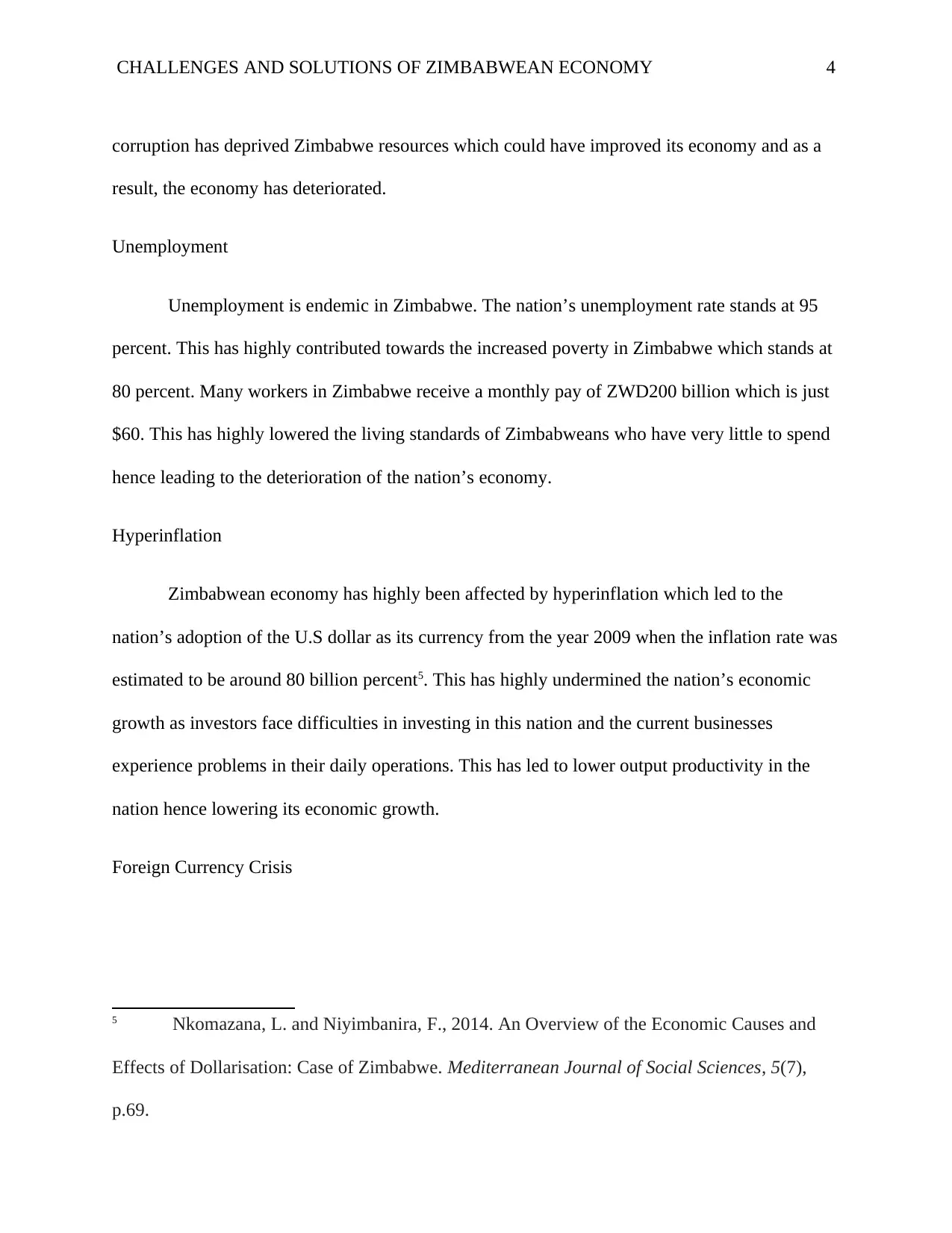
CHALLENGES AND SOLUTIONS OF ZIMBABWEAN ECONOMY 4
corruption has deprived Zimbabwe resources which could have improved its economy and as a
result, the economy has deteriorated.
Unemployment
Unemployment is endemic in Zimbabwe. The nation’s unemployment rate stands at 95
percent. This has highly contributed towards the increased poverty in Zimbabwe which stands at
80 percent. Many workers in Zimbabwe receive a monthly pay of ZWD200 billion which is just
$60. This has highly lowered the living standards of Zimbabweans who have very little to spend
hence leading to the deterioration of the nation’s economy.
Hyperinflation
Zimbabwean economy has highly been affected by hyperinflation which led to the
nation’s adoption of the U.S dollar as its currency from the year 2009 when the inflation rate was
estimated to be around 80 billion percent5. This has highly undermined the nation’s economic
growth as investors face difficulties in investing in this nation and the current businesses
experience problems in their daily operations. This has led to lower output productivity in the
nation hence lowering its economic growth.
Foreign Currency Crisis
5 Nkomazana, L. and Niyimbanira, F., 2014. An Overview of the Economic Causes and
Effects of Dollarisation: Case of Zimbabwe. Mediterranean Journal of Social Sciences, 5(7),
p.69.
corruption has deprived Zimbabwe resources which could have improved its economy and as a
result, the economy has deteriorated.
Unemployment
Unemployment is endemic in Zimbabwe. The nation’s unemployment rate stands at 95
percent. This has highly contributed towards the increased poverty in Zimbabwe which stands at
80 percent. Many workers in Zimbabwe receive a monthly pay of ZWD200 billion which is just
$60. This has highly lowered the living standards of Zimbabweans who have very little to spend
hence leading to the deterioration of the nation’s economy.
Hyperinflation
Zimbabwean economy has highly been affected by hyperinflation which led to the
nation’s adoption of the U.S dollar as its currency from the year 2009 when the inflation rate was
estimated to be around 80 billion percent5. This has highly undermined the nation’s economic
growth as investors face difficulties in investing in this nation and the current businesses
experience problems in their daily operations. This has led to lower output productivity in the
nation hence lowering its economic growth.
Foreign Currency Crisis
5 Nkomazana, L. and Niyimbanira, F., 2014. An Overview of the Economic Causes and
Effects of Dollarisation: Case of Zimbabwe. Mediterranean Journal of Social Sciences, 5(7),
p.69.
Paraphrase This Document
Need a fresh take? Get an instant paraphrase of this document with our AI Paraphraser
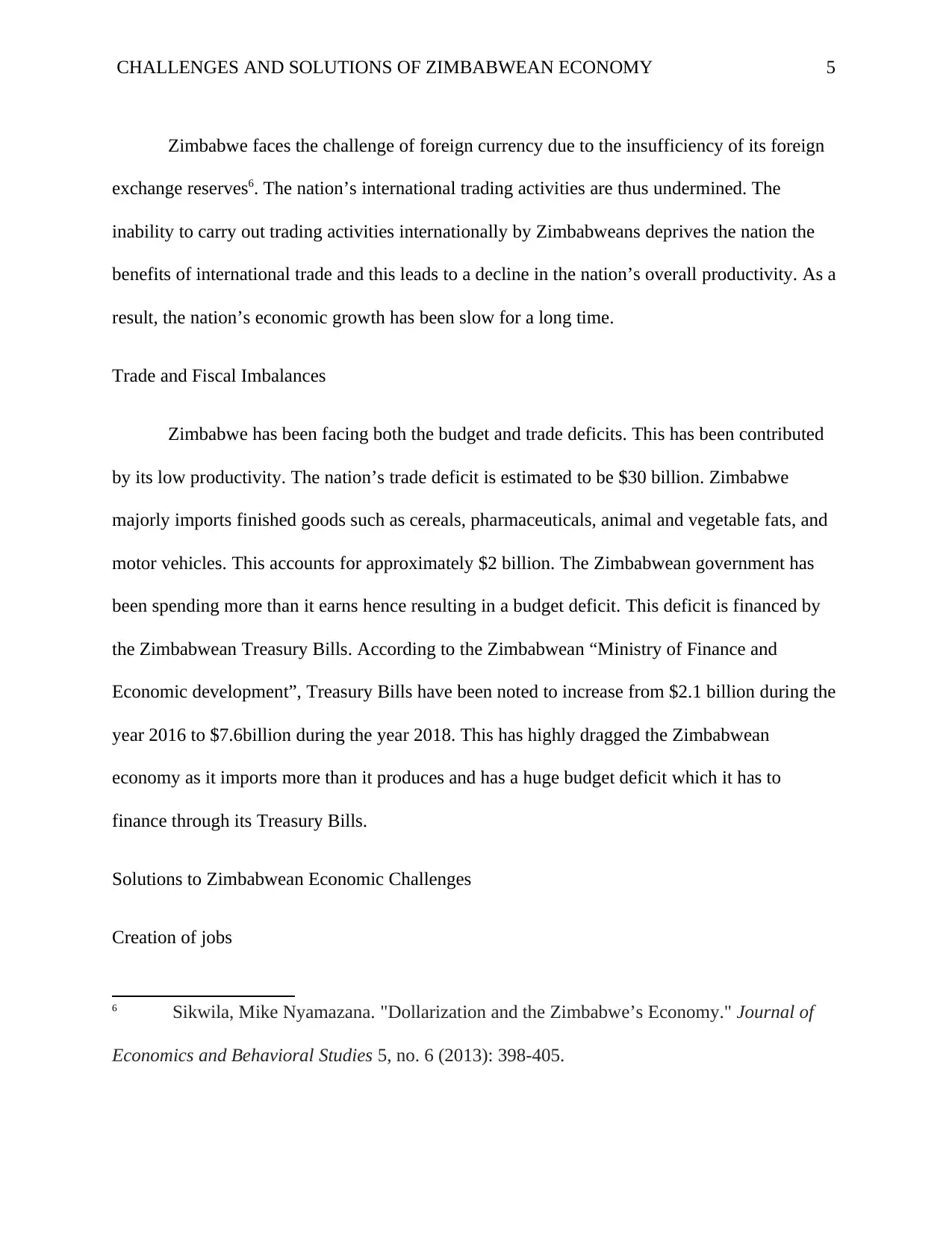
CHALLENGES AND SOLUTIONS OF ZIMBABWEAN ECONOMY 5
Zimbabwe faces the challenge of foreign currency due to the insufficiency of its foreign
exchange reserves6. The nation’s international trading activities are thus undermined. The
inability to carry out trading activities internationally by Zimbabweans deprives the nation the
benefits of international trade and this leads to a decline in the nation’s overall productivity. As a
result, the nation’s economic growth has been slow for a long time.
Trade and Fiscal Imbalances
Zimbabwe has been facing both the budget and trade deficits. This has been contributed
by its low productivity. The nation’s trade deficit is estimated to be $30 billion. Zimbabwe
majorly imports finished goods such as cereals, pharmaceuticals, animal and vegetable fats, and
motor vehicles. This accounts for approximately $2 billion. The Zimbabwean government has
been spending more than it earns hence resulting in a budget deficit. This deficit is financed by
the Zimbabwean Treasury Bills. According to the Zimbabwean “Ministry of Finance and
Economic development”, Treasury Bills have been noted to increase from $2.1 billion during the
year 2016 to $7.6billion during the year 2018. This has highly dragged the Zimbabwean
economy as it imports more than it produces and has a huge budget deficit which it has to
finance through its Treasury Bills.
Solutions to Zimbabwean Economic Challenges
Creation of jobs
6 Sikwila, Mike Nyamazana. "Dollarization and the Zimbabwe’s Economy." Journal of
Economics and Behavioral Studies 5, no. 6 (2013): 398-405.
Zimbabwe faces the challenge of foreign currency due to the insufficiency of its foreign
exchange reserves6. The nation’s international trading activities are thus undermined. The
inability to carry out trading activities internationally by Zimbabweans deprives the nation the
benefits of international trade and this leads to a decline in the nation’s overall productivity. As a
result, the nation’s economic growth has been slow for a long time.
Trade and Fiscal Imbalances
Zimbabwe has been facing both the budget and trade deficits. This has been contributed
by its low productivity. The nation’s trade deficit is estimated to be $30 billion. Zimbabwe
majorly imports finished goods such as cereals, pharmaceuticals, animal and vegetable fats, and
motor vehicles. This accounts for approximately $2 billion. The Zimbabwean government has
been spending more than it earns hence resulting in a budget deficit. This deficit is financed by
the Zimbabwean Treasury Bills. According to the Zimbabwean “Ministry of Finance and
Economic development”, Treasury Bills have been noted to increase from $2.1 billion during the
year 2016 to $7.6billion during the year 2018. This has highly dragged the Zimbabwean
economy as it imports more than it produces and has a huge budget deficit which it has to
finance through its Treasury Bills.
Solutions to Zimbabwean Economic Challenges
Creation of jobs
6 Sikwila, Mike Nyamazana. "Dollarization and the Zimbabwe’s Economy." Journal of
Economics and Behavioral Studies 5, no. 6 (2013): 398-405.
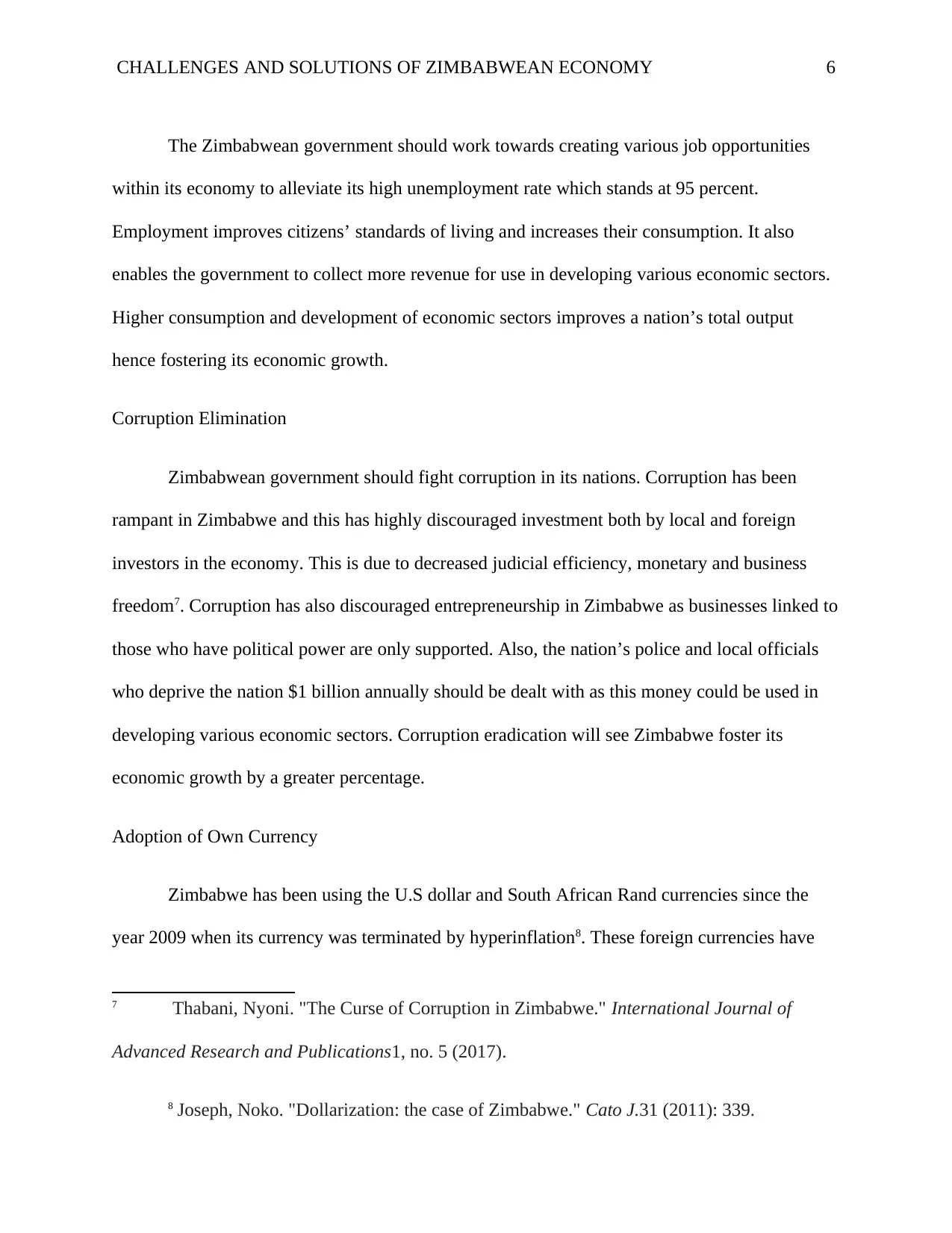
CHALLENGES AND SOLUTIONS OF ZIMBABWEAN ECONOMY 6
The Zimbabwean government should work towards creating various job opportunities
within its economy to alleviate its high unemployment rate which stands at 95 percent.
Employment improves citizens’ standards of living and increases their consumption. It also
enables the government to collect more revenue for use in developing various economic sectors.
Higher consumption and development of economic sectors improves a nation’s total output
hence fostering its economic growth.
Corruption Elimination
Zimbabwean government should fight corruption in its nations. Corruption has been
rampant in Zimbabwe and this has highly discouraged investment both by local and foreign
investors in the economy. This is due to decreased judicial efficiency, monetary and business
freedom7. Corruption has also discouraged entrepreneurship in Zimbabwe as businesses linked to
those who have political power are only supported. Also, the nation’s police and local officials
who deprive the nation $1 billion annually should be dealt with as this money could be used in
developing various economic sectors. Corruption eradication will see Zimbabwe foster its
economic growth by a greater percentage.
Adoption of Own Currency
Zimbabwe has been using the U.S dollar and South African Rand currencies since the
year 2009 when its currency was terminated by hyperinflation8. These foreign currencies have
7 Thabani, Nyoni. "The Curse of Corruption in Zimbabwe." International Journal of
Advanced Research and Publications1, no. 5 (2017).
8 Joseph, Noko. "Dollarization: the case of Zimbabwe." Cato J.31 (2011): 339.
The Zimbabwean government should work towards creating various job opportunities
within its economy to alleviate its high unemployment rate which stands at 95 percent.
Employment improves citizens’ standards of living and increases their consumption. It also
enables the government to collect more revenue for use in developing various economic sectors.
Higher consumption and development of economic sectors improves a nation’s total output
hence fostering its economic growth.
Corruption Elimination
Zimbabwean government should fight corruption in its nations. Corruption has been
rampant in Zimbabwe and this has highly discouraged investment both by local and foreign
investors in the economy. This is due to decreased judicial efficiency, monetary and business
freedom7. Corruption has also discouraged entrepreneurship in Zimbabwe as businesses linked to
those who have political power are only supported. Also, the nation’s police and local officials
who deprive the nation $1 billion annually should be dealt with as this money could be used in
developing various economic sectors. Corruption eradication will see Zimbabwe foster its
economic growth by a greater percentage.
Adoption of Own Currency
Zimbabwe has been using the U.S dollar and South African Rand currencies since the
year 2009 when its currency was terminated by hyperinflation8. These foreign currencies have
7 Thabani, Nyoni. "The Curse of Corruption in Zimbabwe." International Journal of
Advanced Research and Publications1, no. 5 (2017).
8 Joseph, Noko. "Dollarization: the case of Zimbabwe." Cato J.31 (2011): 339.
⊘ This is a preview!⊘
Do you want full access?
Subscribe today to unlock all pages.

Trusted by 1+ million students worldwide
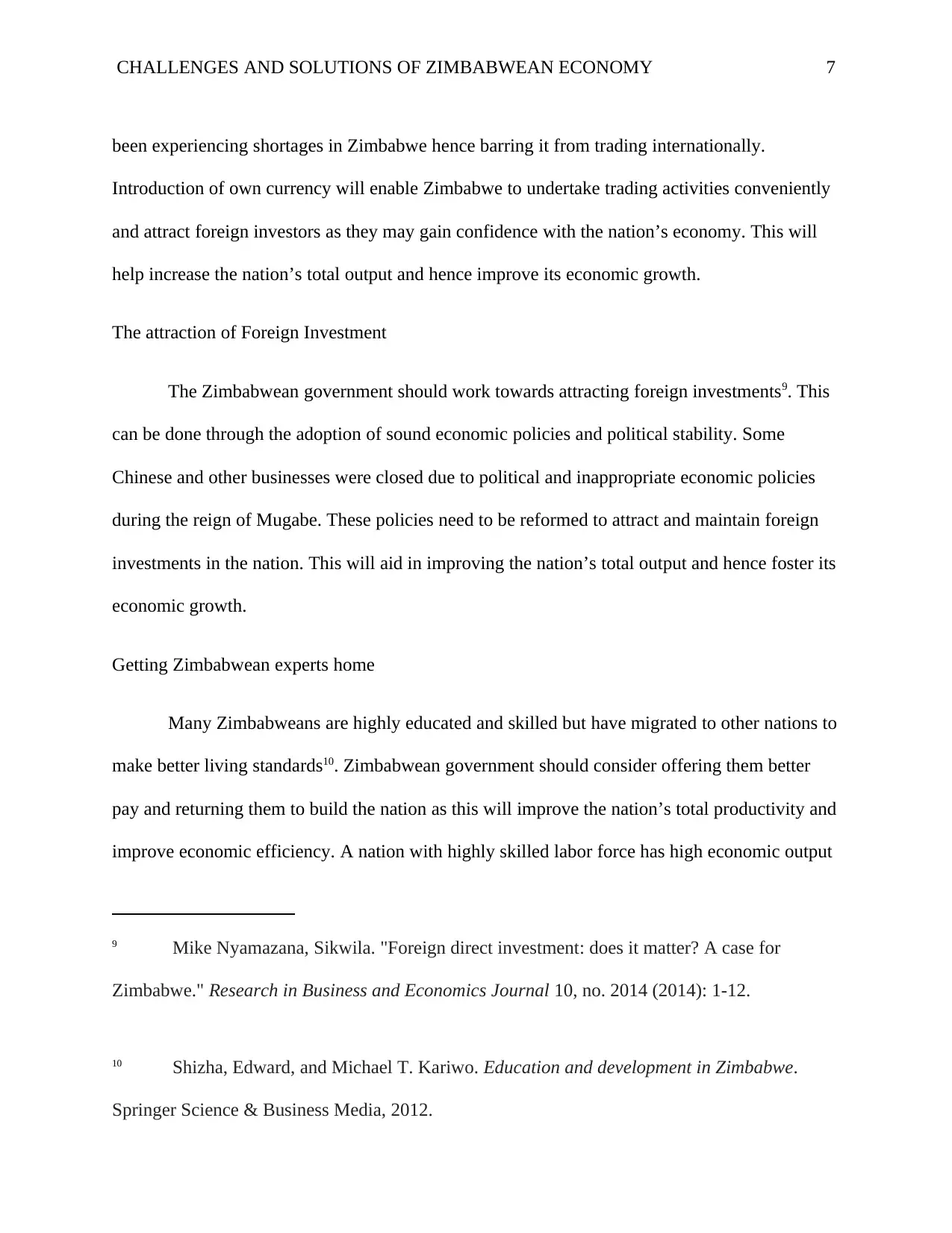
CHALLENGES AND SOLUTIONS OF ZIMBABWEAN ECONOMY 7
been experiencing shortages in Zimbabwe hence barring it from trading internationally.
Introduction of own currency will enable Zimbabwe to undertake trading activities conveniently
and attract foreign investors as they may gain confidence with the nation’s economy. This will
help increase the nation’s total output and hence improve its economic growth.
The attraction of Foreign Investment
The Zimbabwean government should work towards attracting foreign investments9. This
can be done through the adoption of sound economic policies and political stability. Some
Chinese and other businesses were closed due to political and inappropriate economic policies
during the reign of Mugabe. These policies need to be reformed to attract and maintain foreign
investments in the nation. This will aid in improving the nation’s total output and hence foster its
economic growth.
Getting Zimbabwean experts home
Many Zimbabweans are highly educated and skilled but have migrated to other nations to
make better living standards10. Zimbabwean government should consider offering them better
pay and returning them to build the nation as this will improve the nation’s total productivity and
improve economic efficiency. A nation with highly skilled labor force has high economic output
9 Mike Nyamazana, Sikwila. "Foreign direct investment: does it matter? A case for
Zimbabwe." Research in Business and Economics Journal 10, no. 2014 (2014): 1-12.
10 Shizha, Edward, and Michael T. Kariwo. Education and development in Zimbabwe.
Springer Science & Business Media, 2012.
been experiencing shortages in Zimbabwe hence barring it from trading internationally.
Introduction of own currency will enable Zimbabwe to undertake trading activities conveniently
and attract foreign investors as they may gain confidence with the nation’s economy. This will
help increase the nation’s total output and hence improve its economic growth.
The attraction of Foreign Investment
The Zimbabwean government should work towards attracting foreign investments9. This
can be done through the adoption of sound economic policies and political stability. Some
Chinese and other businesses were closed due to political and inappropriate economic policies
during the reign of Mugabe. These policies need to be reformed to attract and maintain foreign
investments in the nation. This will aid in improving the nation’s total output and hence foster its
economic growth.
Getting Zimbabwean experts home
Many Zimbabweans are highly educated and skilled but have migrated to other nations to
make better living standards10. Zimbabwean government should consider offering them better
pay and returning them to build the nation as this will improve the nation’s total productivity and
improve economic efficiency. A nation with highly skilled labor force has high economic output
9 Mike Nyamazana, Sikwila. "Foreign direct investment: does it matter? A case for
Zimbabwe." Research in Business and Economics Journal 10, no. 2014 (2014): 1-12.
10 Shizha, Edward, and Michael T. Kariwo. Education and development in Zimbabwe.
Springer Science & Business Media, 2012.
Paraphrase This Document
Need a fresh take? Get an instant paraphrase of this document with our AI Paraphraser
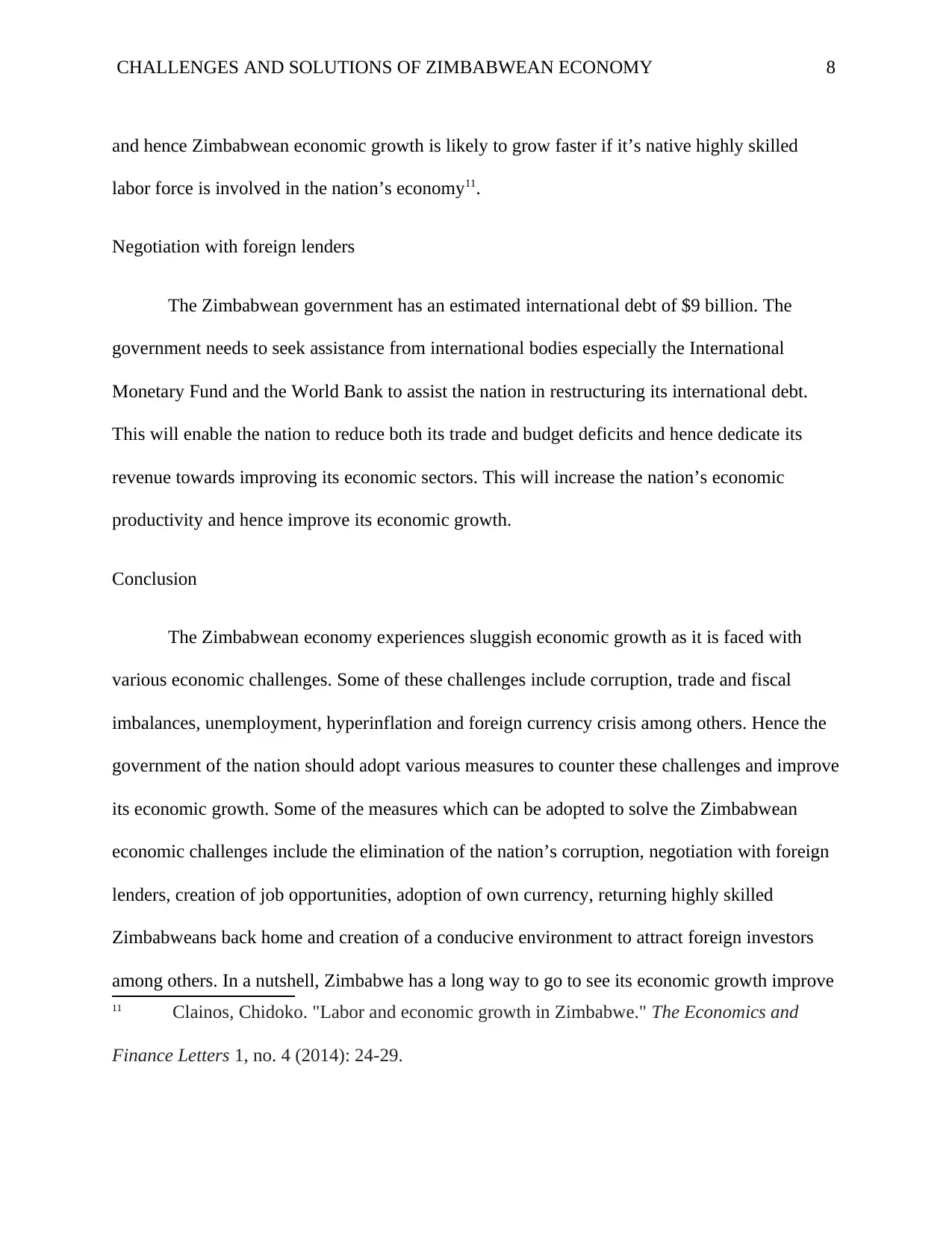
CHALLENGES AND SOLUTIONS OF ZIMBABWEAN ECONOMY 8
and hence Zimbabwean economic growth is likely to grow faster if it’s native highly skilled
labor force is involved in the nation’s economy11.
Negotiation with foreign lenders
The Zimbabwean government has an estimated international debt of $9 billion. The
government needs to seek assistance from international bodies especially the International
Monetary Fund and the World Bank to assist the nation in restructuring its international debt.
This will enable the nation to reduce both its trade and budget deficits and hence dedicate its
revenue towards improving its economic sectors. This will increase the nation’s economic
productivity and hence improve its economic growth.
Conclusion
The Zimbabwean economy experiences sluggish economic growth as it is faced with
various economic challenges. Some of these challenges include corruption, trade and fiscal
imbalances, unemployment, hyperinflation and foreign currency crisis among others. Hence the
government of the nation should adopt various measures to counter these challenges and improve
its economic growth. Some of the measures which can be adopted to solve the Zimbabwean
economic challenges include the elimination of the nation’s corruption, negotiation with foreign
lenders, creation of job opportunities, adoption of own currency, returning highly skilled
Zimbabweans back home and creation of a conducive environment to attract foreign investors
among others. In a nutshell, Zimbabwe has a long way to go to see its economic growth improve
11 Clainos, Chidoko. "Labor and economic growth in Zimbabwe." The Economics and
Finance Letters 1, no. 4 (2014): 24-29.
and hence Zimbabwean economic growth is likely to grow faster if it’s native highly skilled
labor force is involved in the nation’s economy11.
Negotiation with foreign lenders
The Zimbabwean government has an estimated international debt of $9 billion. The
government needs to seek assistance from international bodies especially the International
Monetary Fund and the World Bank to assist the nation in restructuring its international debt.
This will enable the nation to reduce both its trade and budget deficits and hence dedicate its
revenue towards improving its economic sectors. This will increase the nation’s economic
productivity and hence improve its economic growth.
Conclusion
The Zimbabwean economy experiences sluggish economic growth as it is faced with
various economic challenges. Some of these challenges include corruption, trade and fiscal
imbalances, unemployment, hyperinflation and foreign currency crisis among others. Hence the
government of the nation should adopt various measures to counter these challenges and improve
its economic growth. Some of the measures which can be adopted to solve the Zimbabwean
economic challenges include the elimination of the nation’s corruption, negotiation with foreign
lenders, creation of job opportunities, adoption of own currency, returning highly skilled
Zimbabweans back home and creation of a conducive environment to attract foreign investors
among others. In a nutshell, Zimbabwe has a long way to go to see its economic growth improve
11 Clainos, Chidoko. "Labor and economic growth in Zimbabwe." The Economics and
Finance Letters 1, no. 4 (2014): 24-29.
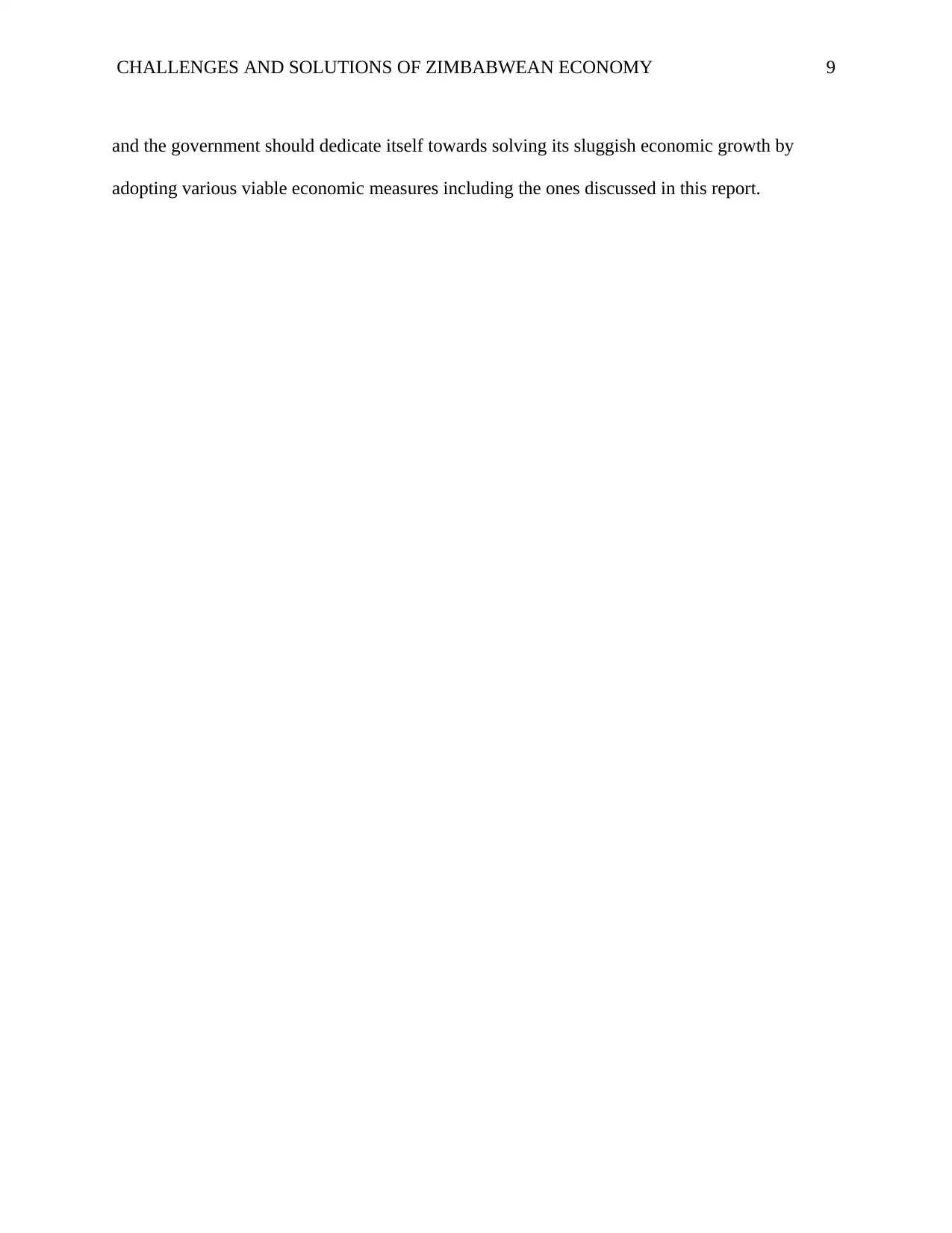
CHALLENGES AND SOLUTIONS OF ZIMBABWEAN ECONOMY 9
and the government should dedicate itself towards solving its sluggish economic growth by
adopting various viable economic measures including the ones discussed in this report.
and the government should dedicate itself towards solving its sluggish economic growth by
adopting various viable economic measures including the ones discussed in this report.
⊘ This is a preview!⊘
Do you want full access?
Subscribe today to unlock all pages.

Trusted by 1+ million students worldwide
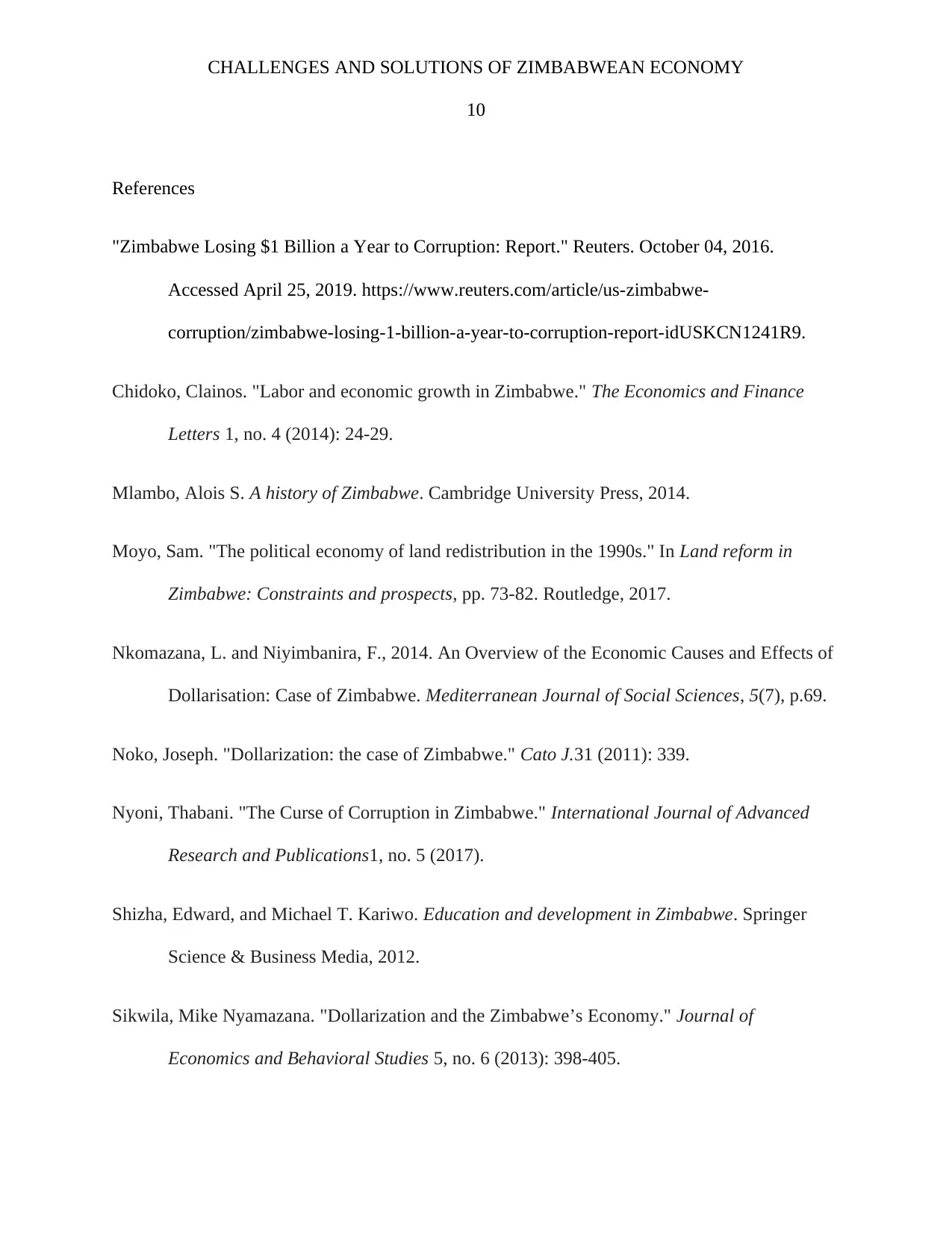
CHALLENGES AND SOLUTIONS OF ZIMBABWEAN ECONOMY
10
References
"Zimbabwe Losing $1 Billion a Year to Corruption: Report." Reuters. October 04, 2016.
Accessed April 25, 2019. https://www.reuters.com/article/us-zimbabwe-
corruption/zimbabwe-losing-1-billion-a-year-to-corruption-report-idUSKCN1241R9.
Chidoko, Clainos. "Labor and economic growth in Zimbabwe." The Economics and Finance
Letters 1, no. 4 (2014): 24-29.
Mlambo, Alois S. A history of Zimbabwe. Cambridge University Press, 2014.
Moyo, Sam. "The political economy of land redistribution in the 1990s." In Land reform in
Zimbabwe: Constraints and prospects, pp. 73-82. Routledge, 2017.
Nkomazana, L. and Niyimbanira, F., 2014. An Overview of the Economic Causes and Effects of
Dollarisation: Case of Zimbabwe. Mediterranean Journal of Social Sciences, 5(7), p.69.
Noko, Joseph. "Dollarization: the case of Zimbabwe." Cato J.31 (2011): 339.
Nyoni, Thabani. "The Curse of Corruption in Zimbabwe." International Journal of Advanced
Research and Publications1, no. 5 (2017).
Shizha, Edward, and Michael T. Kariwo. Education and development in Zimbabwe. Springer
Science & Business Media, 2012.
Sikwila, Mike Nyamazana. "Dollarization and the Zimbabwe’s Economy." Journal of
Economics and Behavioral Studies 5, no. 6 (2013): 398-405.
10
References
"Zimbabwe Losing $1 Billion a Year to Corruption: Report." Reuters. October 04, 2016.
Accessed April 25, 2019. https://www.reuters.com/article/us-zimbabwe-
corruption/zimbabwe-losing-1-billion-a-year-to-corruption-report-idUSKCN1241R9.
Chidoko, Clainos. "Labor and economic growth in Zimbabwe." The Economics and Finance
Letters 1, no. 4 (2014): 24-29.
Mlambo, Alois S. A history of Zimbabwe. Cambridge University Press, 2014.
Moyo, Sam. "The political economy of land redistribution in the 1990s." In Land reform in
Zimbabwe: Constraints and prospects, pp. 73-82. Routledge, 2017.
Nkomazana, L. and Niyimbanira, F., 2014. An Overview of the Economic Causes and Effects of
Dollarisation: Case of Zimbabwe. Mediterranean Journal of Social Sciences, 5(7), p.69.
Noko, Joseph. "Dollarization: the case of Zimbabwe." Cato J.31 (2011): 339.
Nyoni, Thabani. "The Curse of Corruption in Zimbabwe." International Journal of Advanced
Research and Publications1, no. 5 (2017).
Shizha, Edward, and Michael T. Kariwo. Education and development in Zimbabwe. Springer
Science & Business Media, 2012.
Sikwila, Mike Nyamazana. "Dollarization and the Zimbabwe’s Economy." Journal of
Economics and Behavioral Studies 5, no. 6 (2013): 398-405.
Paraphrase This Document
Need a fresh take? Get an instant paraphrase of this document with our AI Paraphraser
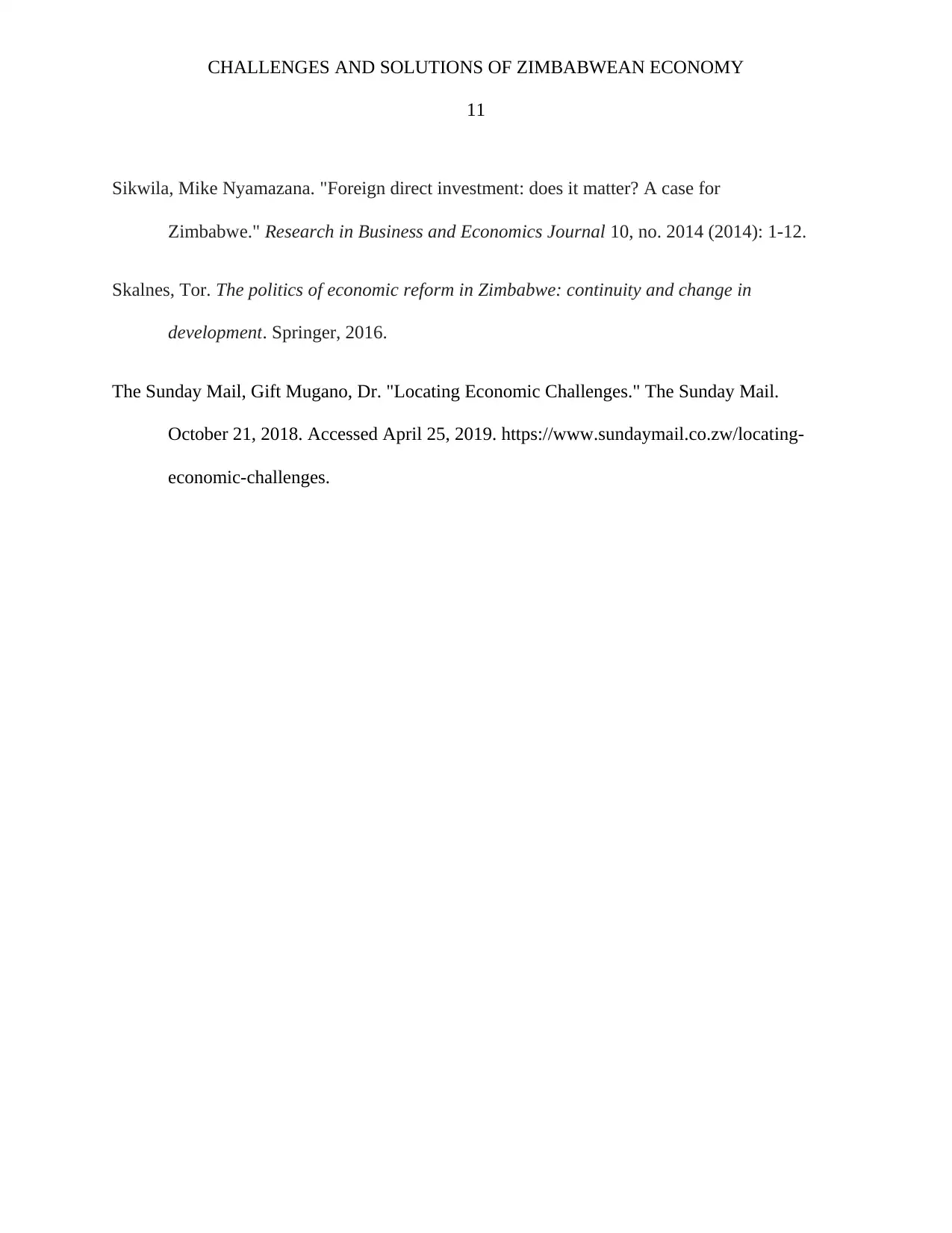
CHALLENGES AND SOLUTIONS OF ZIMBABWEAN ECONOMY
11
Sikwila, Mike Nyamazana. "Foreign direct investment: does it matter? A case for
Zimbabwe." Research in Business and Economics Journal 10, no. 2014 (2014): 1-12.
Skalnes, Tor. The politics of economic reform in Zimbabwe: continuity and change in
development. Springer, 2016.
The Sunday Mail, Gift Mugano, Dr. "Locating Economic Challenges." The Sunday Mail.
October 21, 2018. Accessed April 25, 2019. https://www.sundaymail.co.zw/locating-
economic-challenges.
11
Sikwila, Mike Nyamazana. "Foreign direct investment: does it matter? A case for
Zimbabwe." Research in Business and Economics Journal 10, no. 2014 (2014): 1-12.
Skalnes, Tor. The politics of economic reform in Zimbabwe: continuity and change in
development. Springer, 2016.
The Sunday Mail, Gift Mugano, Dr. "Locating Economic Challenges." The Sunday Mail.
October 21, 2018. Accessed April 25, 2019. https://www.sundaymail.co.zw/locating-
economic-challenges.
1 out of 11
Related Documents
Your All-in-One AI-Powered Toolkit for Academic Success.
+13062052269
info@desklib.com
Available 24*7 on WhatsApp / Email
![[object Object]](/_next/static/media/star-bottom.7253800d.svg)
Unlock your academic potential
Copyright © 2020–2026 A2Z Services. All Rights Reserved. Developed and managed by ZUCOL.





